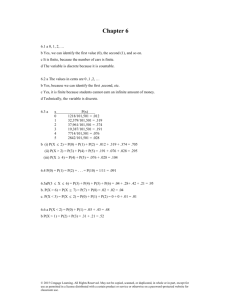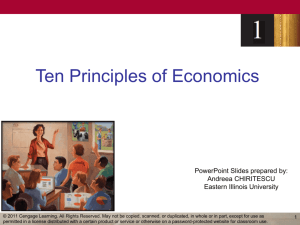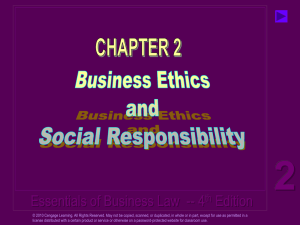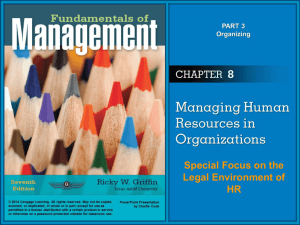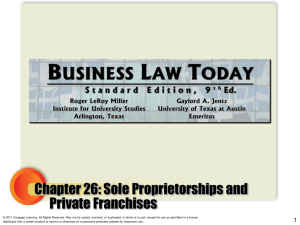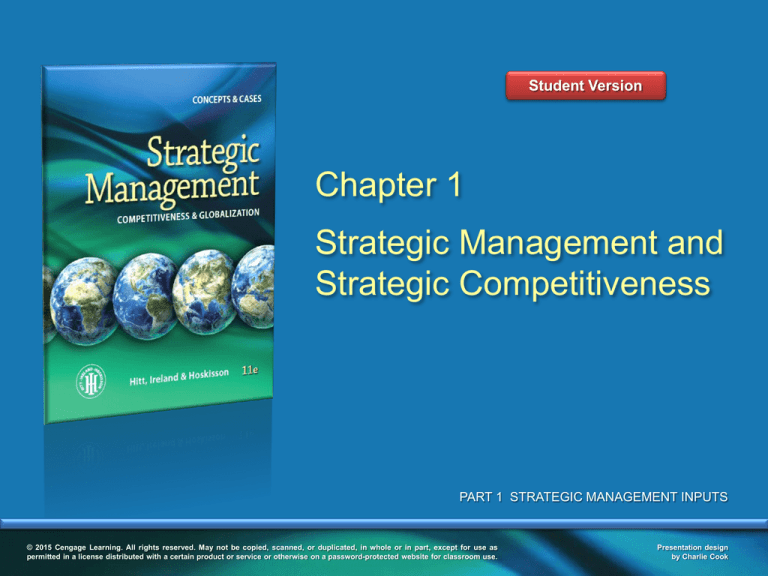
Student Version
Chapter 1
Strategic Management and
Strategic Competitiveness
PART 1 STRATEGIC MANAGEMENT INPUTS
© 2015 Cengage Learning. All rights reserved. May not be copied, scanned, or duplicated, in whole or in part, except for use as
permitted in a license distributed with a certain product or service or otherwise on a password-protected website for classroom use.
Presentation design
by Charlie Cook
Twenty-First Century Competition
Globalization
The global
economy
Rapid
technological
change
Today’s
Competitive
Markets
© 2015 Cengage Learning. All rights reserved. May not be copied, scanned, or duplicated, in whole or in part, except for use as
permitted in a license distributed with a certain product or service or otherwise on a password-protected website for classroom use.
Increasing
importance of
knowledge
and people
1–2
Strategic Competitiveness
Formulation and
implementation of
a superior valuecreating strategy
Commitments and actions to achieve
above-average performance and returns
What the firm
will do
Competitive
advantage
© 2015 Cengage Learning. All rights reserved. May not be copied, scanned, or duplicated, in whole or in part, except for use as
permitted in a license distributed with a certain product or service or otherwise on a password-protected website for classroom use.
What the firm
will not do
1–3
Hypercompetition
Global
economy
Use of
price-quality
positioning to
build market
presence
Strategic options in
hypercompetitive
environments
Creation of new
know-how and
use of first-mover
advantage
© 2015 Cengage Learning. All rights reserved. May not be copied, scanned, or duplicated, in whole or in part, except for use as
permitted in a license distributed with a certain product or service or otherwise on a password-protected website for classroom use.
Technology
Protection or
invasion of
established
geographic or
product markets
1–4
Competitive Success Factors
Are market/
customer-needs
oriented
Have an
entrepreneurial/
opportunistic
mindset
Make effective
use of valuable
competencies
Top
Corporate
Performers
© 2015 Cengage Learning. All rights reserved. May not be copied, scanned, or duplicated, in whole or in part, except for use as
permitted in a license distributed with a certain product or service or otherwise on a password-protected website for classroom use.
Offer new
and innovative
products and
services
1–5
Technology and Technological Changes
Increasing rate of technology
diffusion and the emergence
of disruptive technologies
Technology trends
impacting the
global competitive
environment
The information age: Internet
and the global proliferation of
low-cost computing power
Increasing knowledge intensity
as an intangible source of
competitive advantage
© 2015 Cengage Learning. All rights reserved. May not be copied, scanned, or duplicated, in whole or in part, except for use as
permitted in a license distributed with a certain product or service or otherwise on a password-protected website for classroom use.
1–6
The Industry Organization (I/O) Model
of Above-Average Returns
Diversification
Product
differentiation
Barriers to
market entry
Economies
of scale
Industry
concentration
The Firm’s
Strategic
Choices
© 2015 Cengage Learning. All rights reserved. May not be copied, scanned, or duplicated, in whole or in part, except for use as
permitted in a license distributed with a certain product or service or otherwise on a password-protected website for classroom use.
Market
frictions
1–7
Five Forces Model of Competition
Substitutes
Suppliers
Industry
Rivalry
Buyers
Potential
Entrants
© 2015 Cengage Learning. All rights reserved. May not be copied, scanned, or duplicated, in whole or in part, except for use as
permitted in a license distributed with a certain product or service or otherwise on a password-protected website for classroom use.
1–8
The Resource-Based Model
of Above-Average Returns
Capability
Resources
An integrated
set of resources
Core
competence
A source of
competitive
advantage
Physical, human, and
organizational capital
(tangible and intangible)
© 2015 Cengage Learning. All rights reserved. May not be copied, scanned, or duplicated, in whole or in part, except for use as
permitted in a license distributed with a certain product or service or otherwise on a password-protected website for classroom use.
1–9
Resources As Core Competencies
Costly to imitate
Rare
How resources
become core
competencies
Valuable
Nonsubstitutable
© 2015 Cengage Learning. All rights reserved. May not be copied, scanned, or duplicated, in whole or in part, except for use as
permitted in a license distributed with a certain product or service or otherwise on a password-protected website for classroom use.
1–10
Strategic Decision Making
Industry Organization
(I/O) Model
Resource-Based
Model
Competitive
Strategy
Decision
© 2015 Cengage Learning. All rights reserved. May not be copied, scanned, or duplicated, in whole or in part, except for use as
permitted in a license distributed with a certain product or service or otherwise on a password-protected website for classroom use.
1–11
Stakeholders
Can affect development of the
firm’s vision and mission
Primary
stakeholders
(individuals,
groups, and
organizations)
Are affected by the strategic
outcomes achieved by the firm
Can have enforceable claims
on the firm’s performance
Are influential when in control
of critical or valued resources
© 2015 Cengage Learning. All rights reserved. May not be copied, scanned, or duplicated, in whole or in part, except for use as
permitted in a license distributed with a certain product or service or otherwise on a password-protected website for classroom use.
1–12
Classification of Stakeholders
Categories of
stakeholders
Capital Market
Stakeholders
Product Market
Stakeholders
© 2015 Cengage Learning. All rights reserved. May not be copied, scanned, or duplicated, in whole or in part, except for use as
permitted in a license distributed with a certain product or service or otherwise on a password-protected website for classroom use.
Organizational
Stakeholders
1–13
Capital Market Stakeholders
Preservation
of investment
Influence
Conflicting
expectations of
shareholders
and lenders
Risk/return
Enhanced wealth
© 2015 Cengage Learning. All rights reserved. May not be copied, scanned, or duplicated, in whole or in part, except for use as
permitted in a license distributed with a certain product or service or otherwise on a password-protected website for classroom use.
1–14
Product Market Stakeholders
Types of product
market stakeholders
Suppliers
Customers
Host
communities
© 2015 Cengage Learning. All rights reserved. May not be copied, scanned, or duplicated, in whole or in part, except for use as
permitted in a license distributed with a certain product or service or otherwise on a password-protected website for classroom use.
Unions
1–15
Organizational Stakeholders
Responsibilities of strategic leaders for development
and effective use of the firm’s human capital
Education
and skills of
employees
Organizational
culture and
ethical work
environment
Strategic goals
and global
standards
© 2015 Cengage Learning. All rights reserved. May not be copied, scanned, or duplicated, in whole or in part, except for use as
permitted in a license distributed with a certain product or service or otherwise on a password-protected website for classroom use.
International
assignments
1–16


